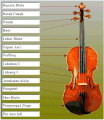Pengguna:Bennylin/Gambar
Tampilan

Berkas-berkas yang saya muat (tidak urut tanggal) dan berkas-berkas menarik dari commons lainnya. :
Seri Kristen
Seri sejarah gereja
Untuk melengkapi artikel sejarah gereja dengan gambar untuk setiap peristiwa.
Seri Yesus
Interpretasi berbagai artis tentang sosok Yesus. Terutama diambil dari en.wiki
Seri Perumpamaan Yesus
Dari berbagai sumber
Seri Kalam Kudus
-
belum terpakai
Seri Logo Gereja
Seri Anabaptis
Seri Shakespeare
Seri Sultan dan Permaisuri Malaysia
-
.jpg, yang lain .gif
-
.PNG, yang lain .gif
-
.jpg, yang lain .gif
Seri Artis
Seri Rembrandt
Lukisan oleh artis Rembrandt yang belum ada di Commons. Terutama diambil dari en.wiki
Seri Johannes Rach
Seri PPI
Foto bewarna mula-mula
Wikimedia Commons memiliki media mengenai Foto bewarna mula-mula.
Seri biola
-
Berkas ketigaku
Seri Solo
Berkas:Ratuluwes.jpg
Lain-lain
Berkas yang dihapus
Dimuat ke commons
-
Berkas pertamaku (commons:Viola.jpg)
-
Berkas keduaku
Duplikat dengan commons
Tidak dipakai
Dari commons
Dari Commons, Majalah National Geographic edisi Maret 1917: lihat di Wikimedia atau di Wikibooks
-
A SPANISH GYPSY
This beautiful girl of Granada represents the highest type of the aristocracy of gypsydom. She would lose caste at once if she were to work, but it is perfectly all right for her to beg or steal—your heart. -
A GARDEN IN THE HOLY LAND
In days gone by, many of the city houses of the more prosperous residents of Jerusalem were built around an open court so that the Moslem women, although secluded, could have a garden, thus affording a measure of outdoor life. This is now the home of an American. -
AN AUTOMOBILE OF THE ORIENT
The donkey is the patient burden-bearer of Northern Africa just as he is in many other parts of the world. He has carried heavy loads from time immemorial—both passengers and freight—and makes no protest until the accumulation of trouble swells his heart and he seeks relief through an impassioned bray. -
THE ABANDONED COTTON MARKET, JERUSALEM
One of the entrances to the temple area within which stands the Mosque of Omar. There is a biblical atmosphere about this old passageway, the cobbles of which have been worn smooth by the weary feet of the ancients. -
A DESERT FLOWER
"Somewhere in the Sahara" lived this child of the Desert until she came to Biskra, the "Garden of Allah," to earn her dowry as a dancer. One would imagine that she is dreaming of some turbaned knight left behind and counting the days until she may return to her natal tent. -
THE GATE OF JAIPUR, INDIA
Built of pink stucco and surrounded by a great wall with many towers, this city is the chief financial center of the state of Raj-putana and a commercial emporium of no mean proportions. Paved streets, some a hundred feet wide, divide the city into six equal sections. Founded in 1728 by the great Maharajah Jai Singh II, it was named for him, and its chief attraction is his magnificent palace in the center of the city. It is the only city in India laid out in rectangular blocks. -
A DAUGHTER OF ARABY
"Full many a flower is born to blush unseen,
And waste its sweetness on the desert air." -
A MINSTREL OF THE ORIENT
This old beggar of Tangier, Morocco, is singing a monotonous, wailing chant to attract the attention of the passers-by. He is a cheerful soul, however, and a pleasant contrast to some of the members of his brotherhood who capitalize their deformities. -
NIGHT IN TETUAN, MOROCCO
Even in daylight one is impressed with the mysterious atmosphere pervading the quiet streets in the old Moorish quarter of Tetuan. Here one is among a strange and alien people, widely different in religion and custom. The eerie quality of the streets is accentuated at night, and the soft radiance of the moonlight and even an occasional flickering lamp are welcome to the wayfarer. -
"AN ARAB SHOD WITH FIRE"
She is a dancer of Algeria and the slow, throbbing music of the Orient is just as necessary for her happiness as the jewels and coins with which she adorns herself. -
SPANISH GYPSY GIRLS
Picturesque in their rags, the girls and women "tell fortunes," and to those who refuse to have their fortune told is flung this quaint curse: "May you be made to carry the mail and have sore feet." -
THE PATIO IN THE HOUSE OF THE DUKE OF ALBA, SEVILLE, SPAIN
A fitting companion of the beautiful Alcazar, Seville's rival of Granada's splendid Alhambra in beauty and in historical renown, is the magnificent palace of the Dukes of Alba. Dating from the fifteenth century, this palace, in its architecture, combines the soft lines of Moorish ideals and the sharp ones of Gothic conceptions, and is a fine example of the blending of the two. -
A DANCER OF THE CAFÉS, ALGERIA
Their faces clouded with a dark paint to increase the natural effect of the desert sun on their skin, their nails darkened with henna, and their cheeks faintly tattooed in blue to show their caste, these beauties of the Ouled Naïl tribe furnish much local color in the crowded cafés of Northern Africa. Their costumes are gorgeous and their heavy ornaments are largely of gold and silver coins. -
FROM THE THRONE ROOM OF THE MOORS
One of the embrasures, or window alcoves, of the Hall of the Ambassadors in the Alhambra at Granada, Spain. In this room met the last assembly of the Moors, summoned by Boabdil to consider the surrender of Granada to the Spanish King Ferdinand just before Columbus discovered America. The visitor is impressed with the fact that the depiction of living things is avoided in Moorish architecture and that the decoration is accomplished with geometrical designs which are astonishingly beautiful. -
A BEDOUIN BEAUTY
"Around her shone
The nameless charms unmarked by her alone,
The light of love, the purity of grace."—Byron. -
THE LURE OF MOTHER EGYPT
In addition to the romance and mystery of Egypt's mighty past, expressed on every hand by her crumbling monuments and age-old customs, there is the elusive charm of the East and the soft coloring in pastel shades at eventide which give to the Occidental visitor a never-to-be-forgotten impression of the Land of the Nile.
Jacob Willemsz. de Wet d. Ä
Peter von Cornelius
-
Yusuf, detil
Philipp Veit
Dewa-dewi Mesir Kuno











































































































































































